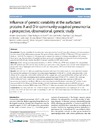Identificador persistente para citar o vincular este elemento:
https://accedacris.ulpgc.es/jspui/handle/10553/46586
| Título: | Influence of genetic variability at the surfactant proteins A and D in community-acquired pneumonia: a prospective, observational, genetic study | Autores/as: | García-Laorden, M. Isabel Rodríguez de Castro, Felipe Solé-Violán, Jordi Rajas, Olga Blanquer, José Borderías, Luis Aspa, Javier Briones, M. Luisa Saavedra, Pedro Marcos-Ramos, J. Alberto González-Quevedo, Nereida Sologuren, Ithaisa Herrera-Ramos, Estefanía Ferrer, José M. Rello, Jordi Rodríguez-Gallego, Carlos |
Clasificación UNESCO: | 32 Ciencias médicas 230204 Genética bioquímica |
Palabras clave: | Human Sp-A Respiratory Syncytial Virus In-Vivo Infectious-Diseases Human Sp-A1, et al. |
Fecha de publicación: | 2011 | Publicación seriada: | Critical Care | Resumen: | Introduction: Genetic variability of the pulmonary surfactant proteins A and D may affect clearance of microorganisms and the extent of the inflammatory response. The genes of these collectins (SFTPA1, SFTPA2 and SFTPD) are located in a cluster at 10q21-24. The objective of this study was to evaluate the existence of linkage disequilibrium (LD) among these genes, and the association of variability at these genes with susceptibility and outcome of community-acquired pneumonia (CAP). We also studied the effect of genetic variability on SP-D serum levels.Methods: Seven non-synonymous polymorphisms of SFTPA1, SFTPA2 and SFTPD were analyzed. For susceptibility, 682 CAP patients and 769 controls were studied in a case-control study. Severity and outcome were evaluated in a prospective study. Haplotypes were inferred and LD was characterized. SP-D serum levels were measured in healthy controls.Results: The SFTPD aa11-C allele was significantly associated with lower SP-D serum levels, in a dose-dependent manner. We observed the existence of LD among the studied genes. Haplotypes SFTPA1 6A(2) (P = 0.0009, odds ration (OR) = 0.78), SFTPA2 1A(0) (P = 0.002, OR = 0.79), SFTPA1-SFTPA2 6A(2) 1A(0) (P = 0.0005, OR = 0.77), and SFTPD-SFTPA1-SFTPA2 C-6A(2) 1A(0) (P = 0.00001, OR = 0.62) were underrepresented in patients, whereas haplotypes SFTPA2 1A(10) (P = 0.00007, OR = 6.58) and SFTPA1-SFTPA2 6A(3)-1A (P = 0.0007, OR = 3.92) were overrepresented. Similar results were observed in CAP due to pneumococcus, though no significant differences were now observed after Bonferroni corrections. 1A(10) and 6A-1A were associated with higher 28-day and 90-day mortality, and with multi-organ dysfunction syndrome (MODS) and acute respiratory distress syndrome (ARDS) respectively. SFTPD aa11-C allele was associated with development of MODS and ARDS.Conclusions: Our study indicates that missense single nucleotide polymorphisms and haplotypes of SFTPA1, SFTPA2 and SFTPD are associated with susceptibility to CAP, and that several haplotypes also influence severity and outcome of CAP. | URI: | https://accedacris.ulpgc.es/handle/10553/46586 | ISSN: | 1466-609X | DOI: | 10.1186/cc10030 | Fuente: | Critical Care [ISSN 1466-609X], v. 15 (R57), (Febrero 2011) |
| Colección: | Artículos |
Citas SCOPUSTM
40
actualizado el 08-jun-2025
Citas de WEB OF SCIENCETM
Citations
36
actualizado el 08-feb-2026
Visitas
107
actualizado el 27-jul-2024
Descargas
67
actualizado el 27-jul-2024
Google ScholarTM
Verifica
Altmetric
Comparte
Exporta metadatos
Los elementos en ULPGC accedaCRIS están protegidos por derechos de autor con todos los derechos reservados, a menos que se indique lo contrario.
